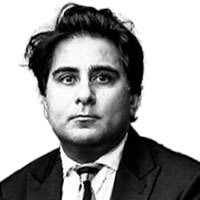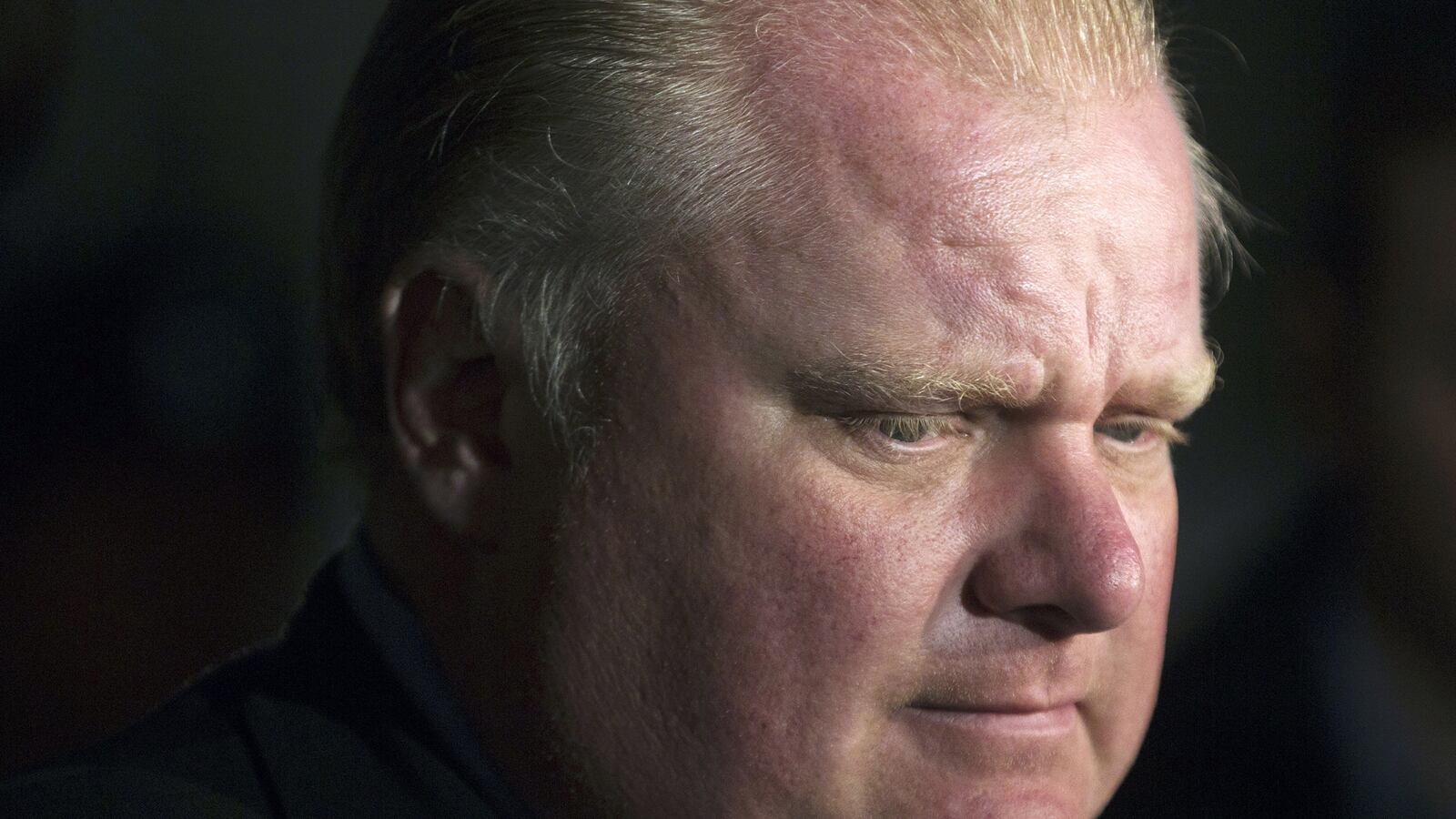“I feel like I have a lot to talk to with Mayor Ford,” Jimmy Kimmel was saying. “I don’t think I’ve had this many questions since the series finale of Lost.”
If ever there was a thunderbolt reminder of mortality, it arrived Tuesday when it hit me that it was only two years ago, this month, when I shuffled backstage at the El Capitan Theatre, at the corner of Hollywood & Highland.
I had been commandeered there to report on an all-too-incongruous late-night-show appearance by then-Toronto mayor Rob Ford, whose very name, at that point, was affixed to the adjective “notorious.”
Ford’s life ended in a quiet hospital room—this after the world-spanning Breaking Bad-goes-SCTV scandal of caught-on-tape crack-smoking (which had Ford in a stupor, calling now-Prime Minister Justin Trudeau a “fag,” and later led to an apparent extortion-related plot related to the video), the bewildering press conferences which once descended into talk of oral pleasuring, the pick-your-poison nights of intoxication which ended with him breaking out in Patois, and the out-and-out mayhem he stirred in Canada.
Ford died in Toronto’s Mount Sinai Hospital, succumbing to pleomorphic liposarcoma, a rare form of soft-tissue cancer, after a reported nine rounds of chemotherapy in so many months. He was 46.
Prime Minister Trudeau tweeted, “Rob Ford fought cancer with courage and determination. My condolences and best wishes to the Ford family today.”
“I will continue to fight,” the feisty-as-ever and man-of-the-people Ford remarked after the last municipal election (during which he’d actually started off running for re-election, with a characteristic volley of chutzpah, but eventually had to drop out of the mayoral race because of his diagnosis).
Vowing to come back to City Hall in 2018 to un-seat the new mayor, John Tory, in Canada’s largest metropolis, he added, “I will continue to fight. Trust me. I’m just warming up.”
At least one of Canada’s national newspapers, I’m told, composed Ford’s obituary weeks ago. The outlook had been looking grim for a while.
Meanwhile, many of the same journalists who exhaustively covered every twitch out of Rob Ford—the ones kept in the stranglehold of an ever-and-ever more surreal political rise that reminds many of a certain citrus-colored national figure in America—staggered, suddenly, to come up with appropriate things to say about a man (and father of two young children) who had just died.
One—the host of local 24-hour TV channel—attended to the news by calling him “a great spirit.”
Both loved and loathed in his time, Ford certainly continues to have a knack for zeitgeist-zapping in death: his demise came just days after a jury weighed a $115 million verdict against Gawker, in the case involving Hulk Hogan and the embattled gossip site (the very one which thrust the saga of Rob Ford on the world).
Another time, another videotape.
Then, there is the T-word: Trump. As many a political decoder has noted, much of the political wizardry of The Donald today, in the United States, is right out of Ford’s playbook—both in terms of plank (the promises of gravy-train reduction), the populism, but also, most critically, the shamelessness and the truth-scrambling.
The Toronto Star’s Washington correspondent, Daniel Dale—who has the unique perch of having covered both Ford, as mayor, in Toronto, and now is on the Trump train—is only too aware about the similarities.
Remarking on some of the Trump rallies he’s attended, Dale told Toronto Life magazine recently, “I felt their utter devotion to this man, and it reminded me so much of the devotion many Ford supporters had and still have. And then there have been a whole bunch of developments in the Trump saga that have been so similar to the Ford saga.”
A key one? “The moment when I really felt it was when Trump said, ‘I could shoot someone on Fifth Avenue and I wouldn’t lose any supporters,’ and I thought, where have I heard that before? It was almost verbatim the Doug Ford (Doug Ford’s brother and key defense-man) quote from 2010 about Rob Ford being able to strangle someone on the steps of City Hall and still win the election.”
Notably, like Trump, Ford was a self-generated, plain-speaking populist despite coming from money himself, his own family fiefdom comprising a company, DECO Labels and Tags, which, in 2014, was said to be generating an estimated $100 million in annual sales.
Unlike Trump, however, who prides himself as not being a “politician,” Ford proudly hailed from something of a political dynasty, with patriarch Doug Sr., having served as a Member of Provincial Parliament in the Ontario legislature, and both his brother, and nephew, Michael Ford, political creatures too.
In death, there has been solace offered for the man, if not the politician.
“As inexcusable and outrageously hypocritical as much of his behavior was, it seemed that most Torontonians were genuinely sympathetic toward his battles with drugs, with the bottle and with cancer,” wrote Chris Selley, a columnist with the National Post.
Writing that Ford should never have been mayor of Toronto, Selley nevertheless added, “Those afflictions are great levellers. We should resolve to afford everyone that sort of understanding and kindness in their darkest moments.”
And, certainly, it wasn’t too long at all before his No. 1 taunter on late-night made his condolences know via Twitter.
“Condolences to the family and fans of @TorontoRobFord—an unforgettable man who loved his job and city and his job like few men I’ve met,” wrote Jimmy Kimmel.






